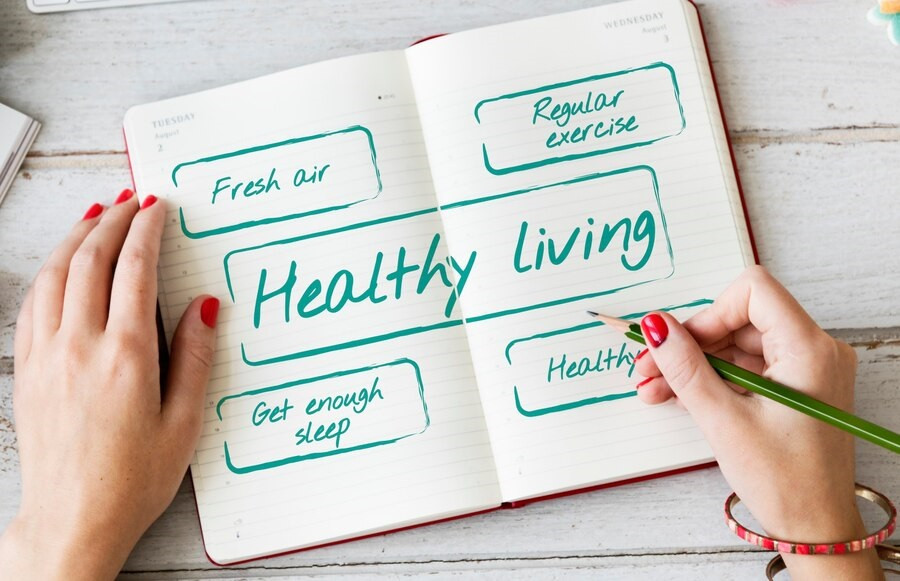Prioritizing mental health is key to experiencing greater happiness, purpose, and fulfillment. Strong mental well-being equips you to confront life's hurdles with resilience and effectively manage stress, difficulties, and setbacks.
Just like maintaining physical health, nurturing mental health is crucial and interconnected. By cultivating positive habits, you can sustain and enhance your mental well-being.
Good Habits to Improve Mental Health
Getting enough, quality sleep
Sleep plays a crucial role in preserving mental health. Conditions like stress, anxiety, and depression can disrupt sleep patterns, leading to sleep disorders. Conversely, irregular sleep schedules, late nights, or chronic sleep deprivation can negatively impact both physical and mental well-being. In addition to fatigue, inadequate sleep heightens the risk of stress, anxiety, depression, and irritability.
To get enough quality sleep, there are several healthy habits that you can do, including:
- Avoid drinking caffeinated beverages above 3 p.m.
- Waking up and go to bed at the same time every day
- Create a quiet, comfortable, and clean atmosphere every night
- Keep the room temperature cool so you can fall asleep easily
Also read: Manfaat "Healing" bagi Kesehatan Mental
Restricting social media play
Excessive social media use has been linked to a variety of negative mental health impacts. Overuse of social media can increase the risk of anxiety and depression due to feelings of inferiority, social pressure, and comparing oneself to unrealistic standards.
Social media can also lead to feelings of worry that you've missed out on important and fun moments that other people are experiencing. This triggers FOMO, the worry that life isn't worth what others have posted.
For better mental health, put your phone away at bedtime to help reduce the tendency to stay awake at night. Turn off social media app notifications and learn how to have a healthy relationship with social media.
Active movement
Research has shown that regular exercise has many benefits for mental health and emotional well-being. Regular exercise leads to feeling emotionally better, improved mood, and reduced stress levels.
People who exercise regularly tend to have a lower risk of developing various mental health conditions such as stress, anxiety, and mood disorders. Keep your body active by jogging, join yoga classes, weight training at the gym, gardening, or hiking.
Also read: Tips Melawan Stigma Negatif Penyakit Mental
Eat nutrient-rich foods
Foods rich in vitamins, minerals, and antioxidants can provide essential nutrients for the brain and help protect against oxidative stress. Foods rich in antioxidants such as vitamins C, E, and beta-carotene, and phytochemical compounds in fruits, vegetables, and grains can help protect the brain from free radicals and oxidative stress.
Healthy fats, especially omega-3 fatty acids in fatty fish, nuts, and certain seeds are also important for brain health. Omega-3s help in the formation and function of brain cells and have anti-inflammatory effects that support mental health.
Nutrients such as B-complex vitamins (especially B6, B12, and folate), and minerals such as zinc, magnesium, and iron have important roles in optimal brain function. Complex carbohydrates and fiber from sources such as vegetables, fruits, and whole grains provide stable energy for the brain, enabling better cognitive function.
Eating nutritious foods in your daily diet can support brain health, and improve concentration, cognitive function, and various neurodegenerative conditions.
Having positive habits is great for maintaining and improving mental health. However, you may need professional help to provide an objective view and help you deal with and overcome mental health.
Use the health consultation service by downloading the Ai Care app through the App Store or Play Store.
Looking for more tips regarding health, first aid, and some home remedies? Click here!
- dr. Yuliana Inosensia
Tartakovsky, M. (2022). 8 Daily Habits for Improved Mental Health. [online] Healthline. Available at: https://www.healthline.com/health/mental-health/habits-to-improve-mental-health.
CDC (2023). About Mental Health. [online] Centers for Disease Control and Prevention. Available at: https://www.cdc.gov/mentalhealth/learn/index.htm.
www.mentalhealth.org.uk. (n.d.). Sleep and mental health. [online] Available at: https://www.mentalhealth.org.uk/explore-mental-health/a-z-topics/sleep-and-mental-health.
Robinson, L. and Smith, M. (2023). Social media and Mental Health. [online] HelpGuide.org. Available at: https://www.helpguide.org/articles/mental-health/social-media-and-mental-health.htm.
Scott, E. (2021). Do You Have FOMO? Here Is How to Cope. [online] Verywell Mind. Available at: https://www.verywellmind.com/how-to-cope-with-fomo-4174664.
Better Health Channel (2021). Exercise and mental health. [online] Better Health Channel. Available at: https://www.betterhealth.vic.gov.au/health/healthyliving/exercise-and-mental-health.
Selhub, E. (2022). Nutritional psychiatry: Your brain on food . [online] Harvard Health Blog. Available at: https://www.health.harvard.edu/blog/nutritional-psychiatry-your-brain-on-food-201511168626.












